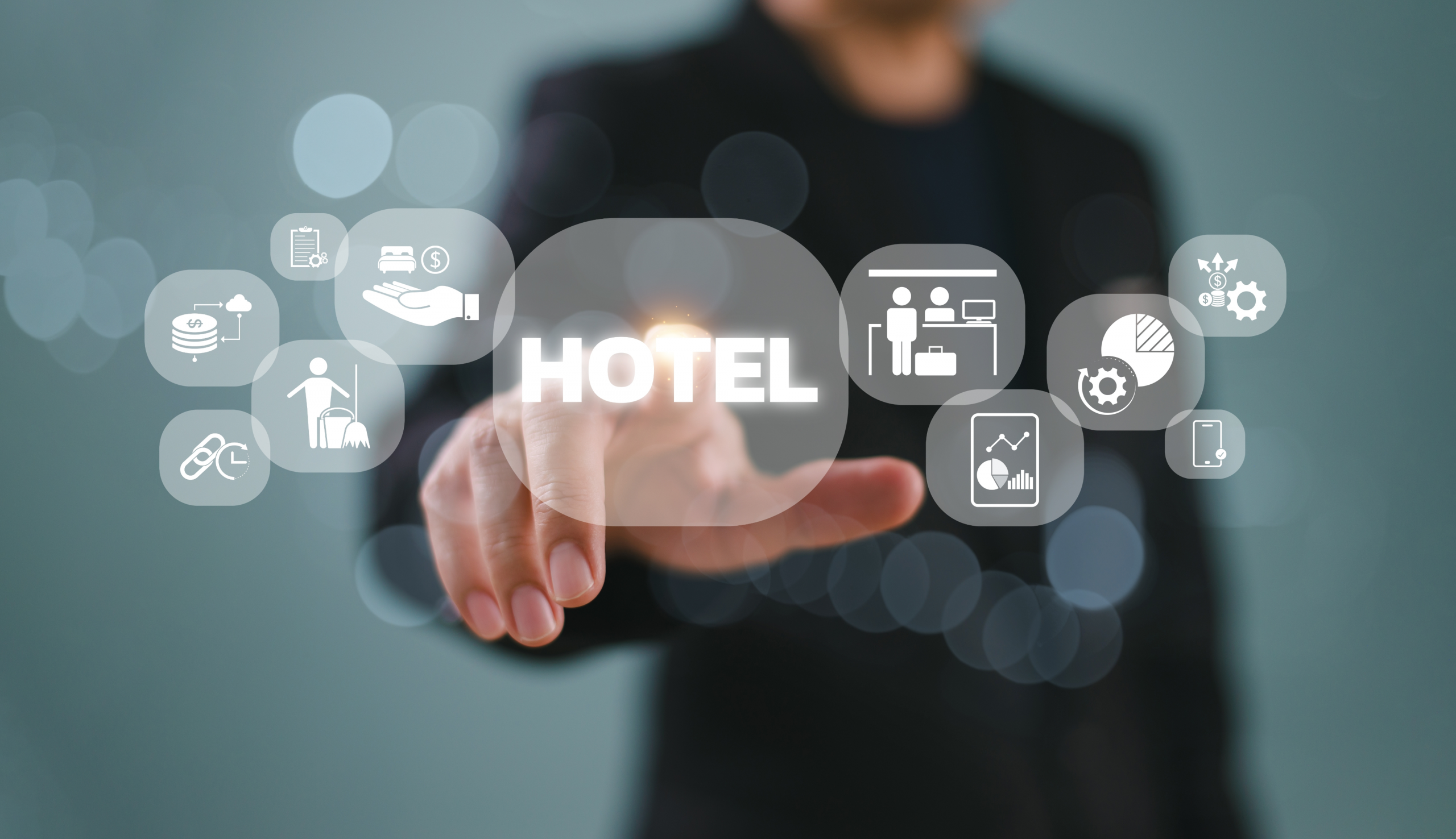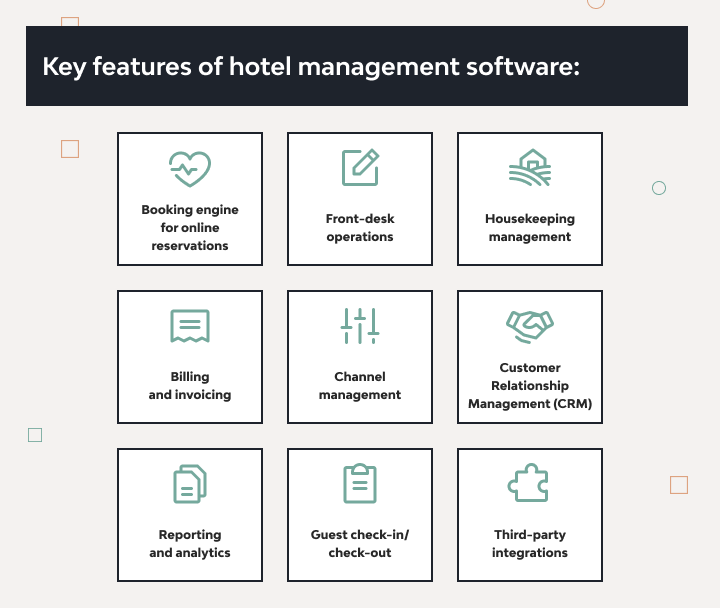Hotel Management Software Development Guide: Features, Process, and Costs

Hospitality is amongst the essential global industries, and it’s digitizing fast. The market for hotel management software is an almost $4-billion niche of its own. Data systems, automation tools, and POS systems are highly demanded by hotels that are striving to deliver a competitive guest experience.
In this article, we discuss solutions that automate reservations, help manage staff workflows and billing, and centralize daily operations. We’ll answer questions like: What is hotel management system’s role in boosting hospitality services? Which features are necessary? And how is this system built?
We’ll also break down the pricing and challenges in the hotel management system development, and take a look ahead at future trends.
What is a hotel management system?
A hotel management system (HMS) is a software solution designed to automate and optimize hotel operations, improve guest experience, and centralize administrative control. It typically includes the must-have modules for reservations, front desk operations, billing, housekeeping management, customer relationship management (CRM), and reporting.
How a hotel management system works is by connecting various hospitality departments into a single interface, where data is synced in real-time. This reduces manual errors, speeds up check-ins and check-outs, and ensures better resource allocation.
Some of the more common types of hotel software include Property Management Systems, Booking Engines, Channel Managers, Revenue Management Tools, and Guest Relationship Platforms. These can be integrated and hybridized in custom hotel management platforms.
Custom hotel management software development allows businesses to tailor the system functionality to a hotel’s unique business model. This is one way to achieve a more authentic platform and have more freedom in development compared to off-the-shelf solutions.
Key features of hotel management software
The core features of a hotel management system comprise the tools and modules that enable various automations, functionalities, and collaborative options through cross-integration. For example, integrated front-desk dashboards can relay the hotel’s core database of guests. Based on the updates, vacant rooms can be automatically notified.
The central hotel management system features you will require today include the following:
Booking engine for online reservations
The central feature of hotel management software is a booking module that processes bookings, online and offline. It is also used for availability management and helps prevent overbooking. The booking engine is commonly integrated with reputable booking platforms and the hotel’s own website. The room inventory can thus be updated in real time.
Front-desk operations
The front desk dashboard is a central hub for guest records, room assignments, check-ins and check-outs, and special requests. Staff can quickly view occupancy, manage walk-ins, process extensions, and resolve conflicts. This enables faster and more personalized guest service while streamlining front desk tasks and making them paperless.
Housekeeping management
This module connects the front desk and housekeeping teams. It can visualize and show which rooms need cleaning, maintenance, or preparation for check-in. Staff can update room status in real time via mobile app integration.
Billing and invoicing
Automated billing enables you to centralize and track every charge — including payments for room stays, services, minibar use, taxes, etc. The system can also generate invoices, support multiple currencies and payment methods, and integrate with accounting software for automated financial record-keeping.
Channel management
A channel manager synchronizes room availability and pricing across multiple online distribution channels. With that in hand, a hotel can prevent double bookings, maintain consistent pricing, and manage revenue more insightfully.
Customer Relationship Management (CRM)
The CRM module will enable your hotel management software to track guest preferences, past stays, spending habits, and feedback. This data can then be used to personalize user experiences, plan targeted promotions, adjust loyalty programs, and boost guest satisfaction and retention. More guest habits can be analyzed in-depth for better-tuned services.
Reporting and analytics
In-depth smart analytics features can be leveraged to gain insight into occupancy trends, revenue performance, staff productivity, and customer satisfaction rates. Hotels can use dashboards to monitor KPIs, get reports and summaries generated autonomously, and make operational or pricing decisions based on real data rather than pure guesses.
Guest check-in/check-out
To smooth out and automate the first and last touchpoints for hotel guests, digital or contactless check-in features can be used. A simple tap in the app enables guests to bypass front desk lines and access their rooms using a mobile key. The convenience of checkouts can be improved with automated invoicing — payment is made as the guest leaves.
Third-party integrations
Additional and common integration options allow the hotel management software to connect with other touchpoints. E.g., POS systems, payment gateways, accounting tools, smart locks, or energy management systems. You can set up a custom data pipeline, where your guests are led from the check-in reception to their rooms with minimum human intervention.
The selected hotel management software features form the foundation — the blueprint planning for your future system. It’s the essential development stages that will help you put them together and set them in motion. Let’s take a look at them.
Hotel management software development process
The process of hotel management software development implies these implementation steps:
- Planning and estimation: Defining hotel’s operational needs, the project scope, required modules, integrations, and business goals based on estimated timelines and budget.
- Prototyping and design: UX/UI designers create wireframes and interactive prototypes to visualize how the system will look and function for staff and guests.
- Choosing the right tech stack: The hotel management system development team selects backend, frontend, and integration technologies for a scalable project base.
- Development process: Developers build core system modules (booking engine, PMS, CRM, etc.), implement business logic, and connect the platform to external service APIs.
- Quality assurance: QA engineers test the final product of the hotel management software development for performance, usability, and data accuracy.
- Deployment: The dev team deploys the system to servers and integrates it with the hotel’s operational environment.
- Maintenance: The hotel management system development team provides post-launch best practices — updates, hotel staff onboarding, and software optimization.
Technology stack for hotel management system development
To meet common hotel management system requirements, the tech stack for a new hospitality solution is usually built around:
- Backend technologies: Python, Ruby, Java, Node.js.
- Frontend technologies: React, Vue.js, Angular.
- APIs and integrations: REST, GraphQL, Payment Gateways, OTA Channels.
- Security measures: SSL, Data encryption, Role-based access control, GDPR, and PCI compliance.
Each hotel management system development is unique in its own right. Your tech stack should be carefully planned and tailored specifically to your needs. Ensure that you entrust it to a proven provider of HMS and travel software development expertise.
Cost of developing hotel management software
New software can cost from $30,000 to $300,000 and above — it all depends on the hotel management system development scope and approach. You can choose to go custom-built or create something that is partially based on existing frameworks.
Small hotels typically require core features such as booking, room management, and billing. On the other hand, resorts or hotel chains may require more in-depth functions, such as channel management, CRM automation, and analytics dashboards. Add to that potential integrations with other existing hardware, like smart locks and POS terminals.
Depending on the set hotel management system requirements, a major cost factor is whether real-time synchronization between locations or multiple sales channels is needed. For example, systems that need to connect to platforms like Booking.com or Airbnb, as well as property group databases, will also require additional development hours and backend work.
In addition to all that, there are extra software development requirements, like mobile app creation, AI-driven pricing, or guest self-service portals. Each of these can widen the expense scope significantly, depending on how omnichannel you’d like to be.
But to try and actually answer the price question, here is a generalized cost breakdown based on common features and complexity of today’s hotel management systems:
| Feature or module | Apprx. dev hours | Estimated cost in USD |
|---|---|---|
| Booking engine and availability calendar | 120–160 hrs | $6,000–$12,000 |
| Front desk dashboard | 100–140 hrs | $5,000–$10,000 |
| Housekeeping management | 60–90 hrs | $3,000–$7,000 |
| Billing and invoicing system | 80–120 hrs | $4,000–$9,000 |
| Channel manager integration | 140–200 hrs | $8,000–$18,000 |
| CRM or loyalty module | 120–180 hrs | $6,000–$15,000 |
| Reporting and analytics dashboards | 160–220 hrs | $8,000–$20,000 |
| Native mobile app (optional) | 200–350 hrs | $12,000–$35,000+ |
To sum up, while the cost scope is very diverse and scenario-based, you can potentially be looking at the following figures:
- Small-scale hotels (basic system): $30,000–$60,000
- Mid-size hotels with integrations: $60,000–$150,000
- Large hotels, resorts, or chains (full ecosystem): $150,000–$300,000+
Keep in mind that, unlike off-the-shelf software, custom hotel management system development allows fuller control over user experience. Custom also means more freedom for scalability considerations, integration options, and other benefits for hotels with unique workflows. So it is a great long-term investment in flexibility and authenticity.
Key challenges in hotel software development
Another key insight in hotel management software development is the range of challenges that may encounter. Here are the most common challenges.
Integration with existing systems
A new solution must be integrated with tools already in use, which may include legacy hotel systems and diverse platforms.
Data security and privacy
Hotel software must process and store sensitive guest data, so strict compliance with data security in hotel tech is a must.
User adoption
Front-desk staff and managers may experience issues when switching from familiar workflows.
Scalability
Your hotel management system development may need to be scaled to sustain higher loads without losing efficiency.
Managing pricing logic and revenue
You will need to implement complex pricing logics that would flexibly correct price and revenue rules without disrupting other tasks.
Future trends in hotel management software
Here’s what you’ll need to keep your hotel management software relevant:
AI and ML
AI/ML can automate pricing, predict demand, and personalize guest experiences via data analytics.
IoT
IoT enables remote controls for smart thermostats, door locks, and lighting for guests.
Voice control and virtual assistants
Voice-enabled systems allow guests to request services or control room settings hands-free.
Blockchain for secure transactions
Blockchain in hotel management software powers foolproof transactions that can be linked to identity data.
Loyalty programs
Your hotel management software’s data insights can be used for personalized loyalty offers.
Mobile-first approach
More guests prefer to check in and control room service from their smartphones.
Contactless technologies
Digital check-in and cashless payments make guests feel comfortable in a new hotel.
Conclusion
The hotel management system is not just a booking tool — it is a smart platform that automates essential hotel operations. It is a single point of centralization that can grow into a unique reservation system with multi-property management, AI-driven personalization, and revenue optimization.
However, the real-world performance will depend entirely on how you approach hotel management software development. It’s essential to tailor a new platform to your hotel’s workflows, equipping it with a modern tech stack, strong software architecture, and seamless third-party integrations (e.g., CRM and PMS features, POS, GDPR and PCI DSS).
The global hospitality sector is growing, and emerging trends dictate the growing importance of new feature-rich software as well. In the nearest future, a truly competitive hotel management system development project will require:
- IoT-enabled smart rooms
- Cloud-native platforms
- API-first ecosystems
- and more thorough automation
Django Stars will guide your choice with HMS and travel software development expertise backed by over sixteen years in the market. Contact us for individual estimates, next-step consultation, and full-cycle development services.
- What is hotel management software?
- Hotel management software is a digital system designed to help hotels automate and streamline daily operations, including reservations, front-desk tasks, housekeeping, billing, revenue management, and guest communication. It also commonly integrates with OTAs, payment gateways, and IoT devices, centralizing the hotel’s workflows and distributing tasks based on typical user roles.
- Why develop custom hotel management software instead of using off-the-shelf solutions?
- Choosing the right solution for your purposes is a very individual decision, but custom software is always more flexible, easy to adapt, and scalable. There can be various reasons why hotels need automation, so it’s crucial to adopt something suitable, rather than opting for universal solutions. This is where tailored solutions provide the flexibility needed for workflow digitization.
- How long does it take to develop hotel management software?
- Real-world use cases vary a lot, but the timeline for software launch can be estimated if you know your budget and scale needs. You also need to understand what may potentially affect the project timeline: the software type (readymade or custom), the size of the development team, the complexity of integrations, the number of modules, and the speed of the chosen service provider.
- How much does hotel management software development cost?
- Similar to the timeline, the project cost is a very individual estimate. It is shaped by the software provider’s rates and collaboration model, system scale and requirements, need for additional expertise, and eventual project lifespan. Always leave a budget for overhead. For more support and maintenance tips, be sure to contact Django Stars directly.


